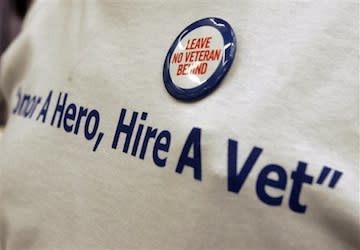 The Lookout
The LookoutEmployers turn away Iraq, Afghanistan veterans

Soldiers are returning home from Afghanistan and Iraq only to receive the cold shoulder from potential employers, reports The Washington Post's Michael Fletcher.
Ten percent of Iraq and Afghanistan veterans were unemployed in November, compared to the 9.1 percent of non-veterans who did not have jobs. Veterans' employment rate has trailed that of non-vets since at least 2005.
Employers' apparent disregard for the veteran talent pool is undermining "the central recruiting promises of the nation's all-volunteer force: that serving in the military will make them more marketable in civilian life," experts told the Post.
"Everybody says, 'We support the troops,'" 22-year-old Marine vet Calvin Artis told The Post. "But a lot of people turn away when it is time to return the favor."
Artis finally landed a $7.50/hour part-time job working at Quick Chek, a convenience store in Manchester, New Jersey, in September. Artis says the skills he learned as a Marine aren't appreciated in the job market. One hiring manager pointed at him and said to a colleague: "Guess what he used to do? He used to shoot people."
Researchers think as many as 20 percent of veterans suffer from post-traumatic stress disorder, and the illness carries some stigma. Experts think that the fear of hiring a worker struggling with PTSD may be a factor in higher unemployment rates for vets.
In California, the unemployment rate for veterans 24 and under is more than 20 percent. Unemployment among disabled vets is close to 50 percent.
"It boils down to a poor economy and also a stigma about the abilities of the young veterans when they come back, as to their physical and mental issues," Navy vet Bob Mulz told KPBS. Mulz, an electronics retailer, helps veterans find business opportunities. "Especially with service-disabled veterans, the attitude is that they are unable to do the work, when in fact disability does not mean inability."
(A volunteer's T-shirt at a California job fair for veterans. AP.)
